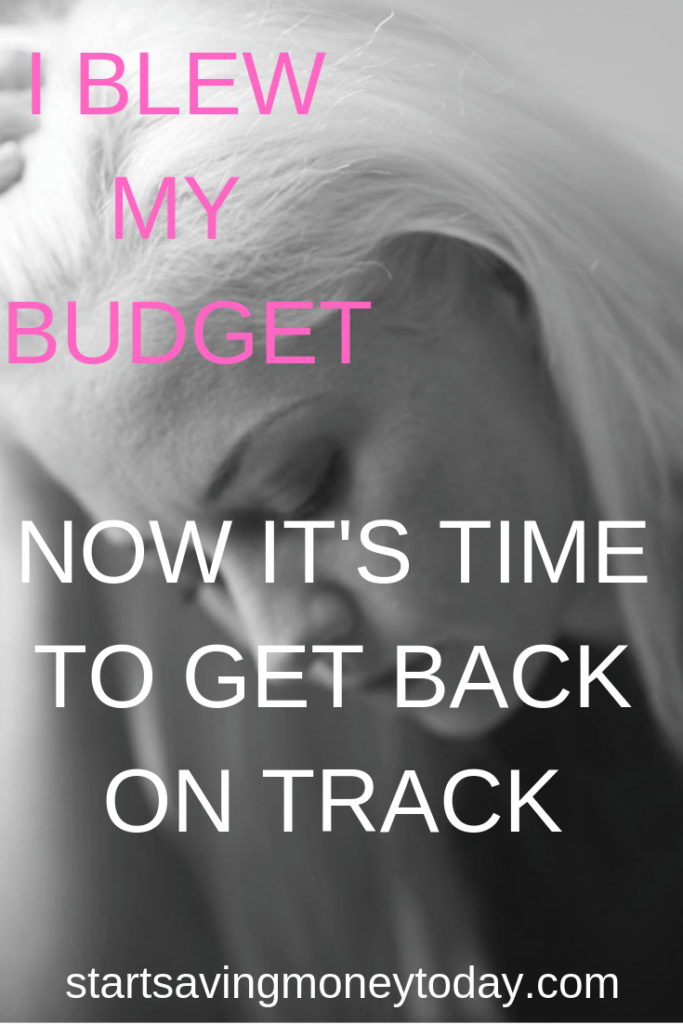I Blew My Budget Now What
You’ve got your plan and you live on a budget. You do the best you can. Most of the time, it’s fairly easy, but eventually something will go wrong. I’m not being negative. I’m being honest. One day you’re looking at your budget and everything is going well. The next you realize, “I blew my budget. Now, what?”
I Blew My Budget Now What
Well…you’re not alone. At one time or another, everyone I know (including me) has been in this situation. It may be that you spent a little too much at the grocery store, or it could be as serious as needing to make an emergency room run or a major car repair. (I’m sure you already know how expensive those can be!) Regardless, if you blew your budget, you need to take steps to recover.
If you are the one saying I blew my budget, here’s the process:
Remain Calm
If you overspent on groceries, it’s probably not a great tragedy. You can be more conservative next week or for a few weeks until you make up the shortage in your budget. Hey…if you over spent on food because it’s a holiday, you could be saved by leftovers.
On the other hand, if you’ve been hit by a huge setback, you’ll need to make some decisions about how you’ll resolve the situation. You need to make a plan for seeing your way through the time it takes to restore the health of your finances. Plans require decisions and initial decisions will lead to making more decisions. Remain calm. The worst time to make a decision is when you are upset. You need to keep emotions out of your decision making process.
Forgive Yourself And Others
If it’s your fault the budget is in the tank, it’s important for you forgive yourself. Beating yourself up doesn’t do any
good. In fact, there are studies that show a sense of guilt may stand in the way of recovery. So, forgive yourself and do it now. Don’t try to wait until you’ve “made it right.” The same is true if someone else is responsible for your budget problems. Forgive them, also. Guess what else can sabotage recovery—anger.
I do want to note that when I say forgive yourself and others, I don’t mean take the approach of “Well, I guess it was meant to be.” What I mean is don’t feed or hang on to negative emotions. You need to stay on your game.
What Should I Do Now?
In any crisis it’s important to figure out what’s going on, and why. Assess the situation. How bad is it, and how well prepared were you. If you spent too much on gas for the car and blew the past week’s fuel fund, you’re really not in much trouble, but why did it happen? “Why?” is an important question. The answer can help prevent the problem from reoccurring.
So, did you budget too little money for fuel (knowing ahead of time how much driving you’d be doing)? Or, was there an emergency?
By the way, most of the time, I know how much gas I’ll need in a week. My schedule is fairly constant: work and home, regular errands, church on Sunday. How much money I designate for my fuel, basically, varies by the price per gallon rather than the amount I’ll use. However, there are times—like the holiday season—when I allot more for use. After all, I’ll be out and about for events that only happen during that time of year.
Here’s a quick story: When we lived in South Carolina we always added more to our fuel fund in the summer, and we always tried to keep the tank full. Why? Because, just about every day. My wife took the kids to the beach. There was one way to get there, and it required crossing a bridge where traffic would back up regularly—and for a long time. Pretty often, cars would run out of gas as people waited for their turn to go. Can imagine the time it took to clear that problem up? –Sometimes, hours. Granted, the problem could have been mitigated if people had turned their cars off while sitting, but this was South Carolina in the summertime; they wanted to run their air conditioners. Of course, if it wasn’t rush hour, there (probably) wouldn’t be a problem on the bridge. And, of course, my wife was never intentionally on it during rush hour, but we wanted to be prepared for “just in case.” The point of this story is that your budget is a spending guide. It allows you to have financial balance in the various arenas of your life, but life isn’t always static.
What If It’s A Real Emergency
If a medical emergency occurs or maybe the car breaks down far from home, our first thought is something like, “Just let it be ok.” That thought dominates as the situation begins to unfold. Eventually, however, we realize we’ll have to deal with the cost sometime soon.
So, how extensive is the hurt, the damage? And, how well are you prepared to cover it?
Unfortunately, because we aren’t financially prepared for something like this, we have to turn to credit too often.
Do you have insurance? Do you have an emergency account? (Insurance doesn’t always cover all the expense.) Was there enough money in your emergency account to cover the need? If that’s the case, then (financially) it’s a matter of replacing the funds you removed—much like the much lesser events above.
In a previous post I shared a story: My car broke down on the way home from work. I needed to get new brakes. Thankfully, it wasn’t far from home, but it couldn’t wait. I had to take care of it immediately, and to get the repair done, I had to spend more than I had in my auto maintenance fund.
But
I had previously saved some money in a sinking fund, so I was ready. I would be over budget in my auto maintenance fund, but I had the money set aside in a quasi emergency fund. (This was cash I could access immediately. My “real” emergency fund is a money market account—not quite so easy to raid.)
The point is being over budget doesn’t need to be a devastating event. Preparation is everything. If you are not prepared for an extreme emergency, change that now. Start building some form of an emergency fund. The money you set aside now is money you won’t have to borrow later.
Another Reason For A Budget And An Emergency Fund
Despite drastic occurrences, the necessities for living continue. Among them are staying current on bills. It’s important to avoid late fees, possible interruption of some services, and a bad mark on your credit report.
There’s a lot that comes into play here. Late fees rob you of money that could be put to better use. Disconnected services like water, gas, and electricity make life uncomfortable—perhaps, dangerous—and take more money to be reestablished. A bad credit rating can keep you from getting funds you may need.
Note: If you’ve read many of my posts, you know I’m against borrowing money, but I do acknowledge that—at times—it may be the only solution (albeit one that brings its own set of problems—repayment and interest.)
Again, I make a case for budgeting and saving against an emergency. Get ready for life to go awry.
At Times I Choose To Go Without
Years ago, there was a time I chose to walk to work—and home, too, if I couldn’t get a ride. My car was broken and I didn’t have the cash to have it fixed. I was determined not to put the repair on a credit card or take out a loan to cover it. It took me several months to save the money I needed, but I had made up my mind not to blow my budget. Thankfully, it was summer.
I wasn’t going to go any further with that story, but I feel obliged to tell you it happened when I was much younger and before I got married.
Since I’ve been married, there have been occasions when my budget’s been blown. To make up the deficit, a good number of those times my wife and I would choose to cut our grocery fund—eat more sparingly for a while—and find free entertainment. (Libraries are a great source of entertainment. They bring in a variety of musicians and lecturers, crafters—a lot more than just books. It’s worth taking a look at what they have scheduled.)
Side Hustles
Cutting back on spending in other areas is a good way to get back on track if your shortage isn’t too great, but we all know that we—sometimes—blow it big time. If you need to find more money than you can being semi miserly for a short period of time, maybe you or your spouse may need to look into finding a side hustle or a part-time job. Quit a few side hustles are easy to start. Here’s a short list: babysitting, house sitting, dog walking, yard work, and detailing cars. Also, Uber and door dash are among a number of businesses run through apps that can help you earn extra money.
Emergency Account
I advocate having an emergency fund and there are times the money in that fund can be of great benefit, But, in my opinion you should never get into your emergency account unless nothing else will work. I say this because too many people use their emergency funds only to be faced with another emergency and no alternative to cover it other than to go into debt. Often, you can make up a budget deficit by being a little more frugal or earning some extra money.
Note: I will use funds from my emergency account over putting something I can’t pay off immediately on my charge card. Do everything you can to avoid using credit. And, it goes without saying, if you must take funds from your emergency account, they need to be replaced as quickly as possible.
In The Future
Planning is everything, but no matter how well we plan, there are times when “stuff” happens. I recommend using a sinking fund which is a collection of sub-funds for as many facets as you can think of for every budget category, and I don’t feel bad about moving funds around within a category. (Note: Those funds still need to be replaced as quickly as possible.
Conclusion
I blew my budget, which is a common problem. it does give us the chance to learn from our mistakes. You’ll recover. Just start over.


